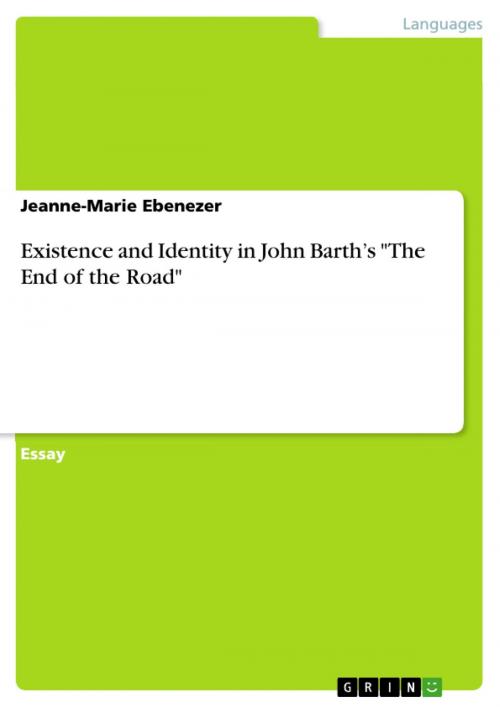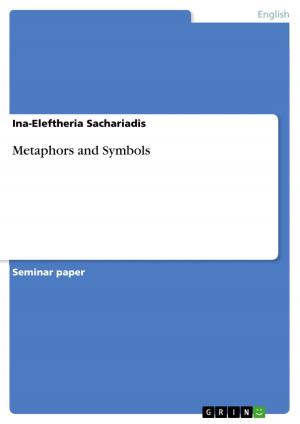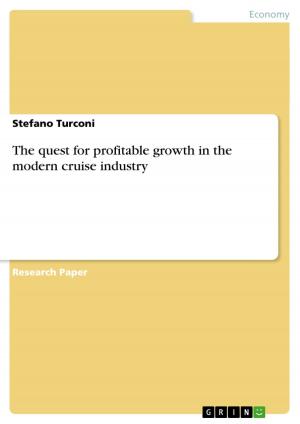Existence and Identity in John Barth's 'The End of the Road'
Fiction & Literature, Literary Theory & Criticism, British| Author: | Jeanne-Marie Ebenezer | ISBN: | 9783640670819 |
| Publisher: | GRIN Publishing | Publication: | July 28, 2010 |
| Imprint: | GRIN Publishing | Language: | English |
| Author: | Jeanne-Marie Ebenezer |
| ISBN: | 9783640670819 |
| Publisher: | GRIN Publishing |
| Publication: | July 28, 2010 |
| Imprint: | GRIN Publishing |
| Language: | English |
Essay from the year 2010 in the subject English - Literature, Works, grade: 1,0, University of Freiburg, course: Postmodernism, language: English, abstract: The questions of identity and existence are both indisputably major themes in John Barth's The End of the Road. This can be seen considering merely the first statement by the protagonist, Jake Horner: 'In a sense, I am Jacob Horner' (Barth, 255). Many critics have picked up on this phrase and refer it to Horner's indecisiveness, as does David Morrell: 'In a sense, too, he is not Jacob Horner: he is anyone he wants to be' (Morrell, 18). Surely, Horner is inconsistent and cannot seem to make rational decisions, but what is more is that his inconsistency does not restrict itself to not knowing what body position to choose when facing the Doctor. It is even more important what Jake Horner's position reflects, namely the role he assumes when facing the Doctor: 'to sit sideways, of course, would be unthinkable, and spreading your knees in the manner of the Doctor makes you acutely conscious of aping his position, as if you hadn't a personality of your own' (Barth, 256). In this passage, Horner is anxious to pick the right position, hence adopting a suitable reflection of the Jacob Horner he wants to portray at that point. He is therefore pondering what mask to put on, or what role to play that would suit him best. The notion of awareness is of great importance in this context, since this paper will attempt to fathom how appearance is linked to identity and therefore to existence. The main argument this paper will make is that in The End of the Road existence is simply a compilation of masks. To some extent Jake Horner is conscious of this role-play and can therefore indeed be 'anyone he wants to be' (Morrell, 18), whereas the Morgans fervently believe that their marriage, an absolute value to them, is mask-free. Since this opposition eventually leads to Rennie's crisis it is important to portray how these three main characters handle their own masks and the masks of others.
Essay from the year 2010 in the subject English - Literature, Works, grade: 1,0, University of Freiburg, course: Postmodernism, language: English, abstract: The questions of identity and existence are both indisputably major themes in John Barth's The End of the Road. This can be seen considering merely the first statement by the protagonist, Jake Horner: 'In a sense, I am Jacob Horner' (Barth, 255). Many critics have picked up on this phrase and refer it to Horner's indecisiveness, as does David Morrell: 'In a sense, too, he is not Jacob Horner: he is anyone he wants to be' (Morrell, 18). Surely, Horner is inconsistent and cannot seem to make rational decisions, but what is more is that his inconsistency does not restrict itself to not knowing what body position to choose when facing the Doctor. It is even more important what Jake Horner's position reflects, namely the role he assumes when facing the Doctor: 'to sit sideways, of course, would be unthinkable, and spreading your knees in the manner of the Doctor makes you acutely conscious of aping his position, as if you hadn't a personality of your own' (Barth, 256). In this passage, Horner is anxious to pick the right position, hence adopting a suitable reflection of the Jacob Horner he wants to portray at that point. He is therefore pondering what mask to put on, or what role to play that would suit him best. The notion of awareness is of great importance in this context, since this paper will attempt to fathom how appearance is linked to identity and therefore to existence. The main argument this paper will make is that in The End of the Road existence is simply a compilation of masks. To some extent Jake Horner is conscious of this role-play and can therefore indeed be 'anyone he wants to be' (Morrell, 18), whereas the Morgans fervently believe that their marriage, an absolute value to them, is mask-free. Since this opposition eventually leads to Rennie's crisis it is important to portray how these three main characters handle their own masks and the masks of others.















